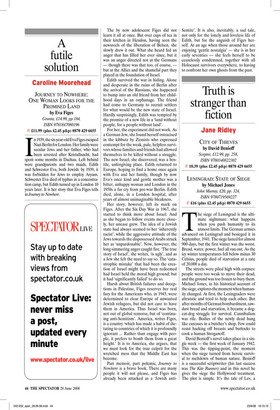A futile solution
Caroline Moorehead
JoURNEY To NowHERE: oNE woMAN LooKS FoR THE PRoMISED LAND by Eva Figes Granta, £14.99, pp.184, ISBN 9781847080196 ✆ £11.99 (plus £2.45 p&p) 0870 429 6655 In 1939, the six-year-old Eva Figes escaped Nazi Berlin for London. Her family were secular Jews and her father, who had been arrested after Kristallnacht, had spent some months in Dachau. Left behind were grandparents and two maids, Edith and Schwester Eva, both Jewish: by 1939, it was forbidden for Jews to employ Aryans. Schwester Eva died of typhus in a concentration camp, but Edith turned up in London 10 years later. It is her story that Eva Figes tells in Journey to Nowhere. The by now adolescent Figes did not learn it all at once. But over cups of tea in their kitchen in Hendon, having seen the newsreels of the liberation of Belsen, she slowly drew it out. What she heard fed an anger that has filled her ever since, but it was an anger directed not at the Germans — though there was that too, of course, — but at the Allies and the shameful part they played in the foundation of Israel.
Edith survived the war in hiding. Alone and desperate in the ruins of Berlin after the arrival of the Russians, she happened to bump into an old friend from her childhood days in an orphanage. The friend had come to Germany to recruit settlers for what would be the new state of Israel. Hardly surprisingly, Edith was tempted by the promise of a new life in a ‘land without people, for a people without land’.
For her, the experiment did not work. As a German Jew, she found herself ostracised in the kibbutz by Zionists who expressed contempt for the weak, pale, helpless survivors whose families and friends had allowed themselves to be killed without a struggle. The new Israel, she discovered, was a hostile, unforgiving place. Edith returned to Europe, hoping to find a home once again with Eva and her family, though by now Eva’s once kind and gentle mother was a bitter, unhappy woman and London in the 1950s a far cry from pre-war Berlin. Edith died, alone, in a London hospital, after years of almost unimaginable bleakness.
Her story, however, left its mark on Figes. After the Six Day War in 1967, she started to think more about Israel. And as she began to follow events more closely, her unease grew. The idea of a Jewish state had always seemed to her ‘inherently racist’, while the aggressive attitude of the Jews towards the dispossessed Arabs struck her as ‘unpardonable’. Now, however, the long simmering anger caught fire. ‘The true story of Israel’, she writes, ‘is ugly’, and as a Jew she felt the need to say so. The ‘catastrophic mistake’ that had been the creation of Israel might have been redeemed had Israel held the moral high ground; but it had ‘significantly failed’ to do so.
Harsh about British failures and deceptions in Palestine, Figes reserves her real fury for the Americans who, in 1945, were determined to clear Europe of unwanted Jewish refugees, but did not care to have them in America. Thus Israel was born, not out of global remorse, but of ‘continuing anti-Semitism’. America, writes Figes, is a country ‘which has made a habit of dictating to countries of which it is profoundly ignorant ... Rather than engage with people, it prefers to bomb them from a great height.’ It is to America, she argues, that we must look for the true culprit for the wretched mess that the Middle East has become.
Part memoir, part polemic, Journey to Nowhere is a brave book. There are many people it will not please, and Figes has already been attacked as a ‘Jewish anti Semite’. It is also, inevitably, a sad tale, not only for the lonely and loveless life of Edith, but for the anguish of Figes herself. At an age when those around her are enjoying ‘gentle nostalgia’ — she is in her early seventies — she feels herself to be ceaselessly condemned, together with all Holocaust survivors everywhere, to having to confront her own ghosts from the past.


















































































 Previous page
Previous page